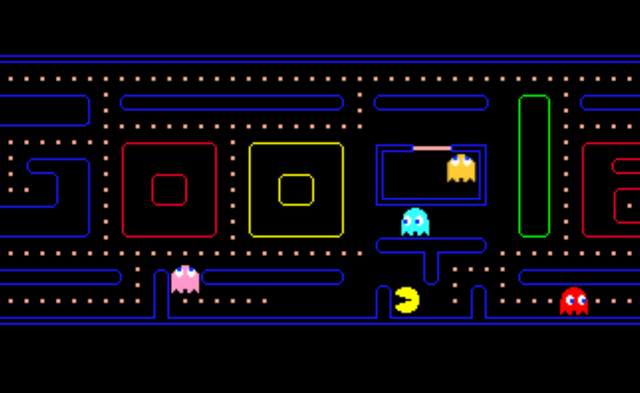
Pac-Man is one of the earliest, simplest computer games.
The game’s world is a small maze, full of white balls. The player moves the yellow ball, which "swallows" white balls. Wandering around the maze and looking for "food", Pac-Man must avoid four "ghosts", also moving around the maze. Meeting with them ends with "death." In the maze, you can also find bigger, colorful balls. After eating them, you do not have to be afraid of ghosts: on the contrary, you can hunt them and they run away. In order to win you need to stay alive until you "eat" all the white balls. (You can play Pac-Man on Google-Doodle for a while before you continue reading).
Why am I writing about Pac-Man? Well, if you really immerse yourself in the game, you’re suddenly able to answer the most fundamental questions of philosophers and out of these answers, you can build a complete and fully operational worldview. In my opinion, this is a very valuable experience that we are missing nowadays.
What are the components of a worldview?
According to Annick de Witt, in order to describe someone's view of the world, we must know the answers to five questions.. (Inside Pac-Man universe we know them all!).
What is the world? The world is a maze, full of tasty balls and dangerous ghosts. What to look for in life? It is worth to look for white and colored balls while at the same time avoiding ghosts. Who am I? I am an eater/prey/hunter. How to cooperate with others? Just meet with colorful balls, and then they will give you the "power" of hunting ghosts. Where to get reliable knowledge about the world? All the knowledge needed in the world of Pac-Man is in the instruction attached to the game.
Every day in our complex "real" world these very deep and very general questions are almost invisible to us, hidden under the more detailed 2nd, 3rd, and 4th-degree questions. In the extremely simplified world of Pac-Man, there is only one level of reality. The Pac-Man and all simple games are so captivating because we are immersed in something that is completely understandable.

Meantime, in the “real” world...
Unfortunately, as soon as we turn off the console and go back to the everyday, we quickly stop understanding anything.
What is this "real" world? Astrophysicist Adam Frank admits that after several thousand years of philosophy and several hundred years of theoretical physics, we do not even know what the basic "matter" of the world is, let alone more complex structures. The matter was supposed to consist of atoms connecting and bouncing off each other like billiard balls. Now according to quantum physics, these "particles" can be also "waves". Or maybe they are multi-dimensional particles that belong to the vast Multiverse besides our small Cosmos?
What to look for in life? Philosopher Alain de Botton says that when the English stopped attending the churches in the mid-nineteenth century, Matthew Arnold and John Stuart Mill were looking for something that could guide people, help them deal with life. They decided that culture would do it. In Plato's Dialogues, Shakespeare's plays, de Montaigne's essays, and Tolstoy's novels, secular society will find what they are no longer looking for in the Bible. According to de Botton, this project collapsed. Going to any liberal University and asking professors there for the meaning of life may end in a psychiatric examination.
What is a man? In 1974, the philosopher Thomas Nagel argued that we would never be able to see the world as bats see it, and the impression that we know something about ourselves results from the fact that the research about the human mind simply bypass the "hard problem" of our consciousness. What is that strange thing?! Where did it come from and what purpose could it serve?! (For example, from an evolutionary point of view, consciousness is not needed at all). Frank thinks that we know about consciousness so much as about the matter: nothing. How may we possibly ask who are we in this situation?
How to efficiently cooperate with other people? Here, "hard problems" really begins! Historian Yuval Harari shows that homo sapiens can get along in groups of millions or even billions of individuals (such as communities of the Catholics, US dollar users or football fans). However, we do not get along because we all see the same objective "reality" and on this basis, we build fair "social contracts", beneficial to all interested parties. It’s precisely the opposite. Our agreements are possible thanks to the social process of creating and protecting fictional social orders: they are inter-subjective worlds, existing only in our mass imagination. Harari point to such fictions as, for example, Judaism, communism, Great Britain, real estate laws, American dollars, Coca Cola company, and even Elvis Presley (as a legend, not as a physical person). Agreements work because their nature as fictions is hidden. Everyone from birth is trained to confuse these imagined orders with an objective order. Fiction is embedded in our physical environment (flags, uniforms, churches, town halls, company logos, etc.). Fiction shapes our subjective, private feelings and dreams. According to Harari, contemporary lifestyle, the search for diversity, the desire to travel, and even extreme individualism (Listen to your heart!) is an evidence for the durability and immense strength of the romantic, national, capitalist and humanistic myths…
Where to get knowledge about the world? The philosopher of science Nicholas Maxwell deprives his readers of hope where they have the most. In his opinion, after the division of science and philosophy, which has occurred since the days of Newton's Philosophiae Naturalis Principia Mathematica today's philosophy has almost nothing to do and science conceals its own assumptions. Does any of them deserve our trust?

Dawn of the Scientific Worldview Studies
According to de Botton, at the basis of contemporary university education is the belief that despite the described problems with a worldview the situation is not dramatic, because life isn't particularly tragic. The lack of answers to the Big Questions does not have to bother us. Somehow you can always go through this life ... You are born, you learn, you find a job, you have children, you go to friends' weddings, then to their funerals, and eventually you grow old yourself, put yourself in a coffin and close the lid behind you. And that's it. It can be done. As a reasonable adult, I do not need any special help here. It's only life after all ...
And yet the clear, understandable worlds of Pac-Man and thousands of other games, where we know the rules and know what the win consists of - still enchanting us. Besides, those who no longer go to churches, for the most part, have not become blunt existentialists. They are looking for the key to the "secret of a successful life" on their own. Bookstores offer them bestselling modern catechisms with titles like "See you at the top" or "Awaken the Giant Within".
Most importantly something also begin to slowly change at universities. The subject of worldview takes on significance in areas as diverse as cultural anthropology, psychology, neuroscience, and cognitive science, philosophy, theology, religious studies, sociology, political sciences, sociology, big history, system science, computer science and research on artificial intelligence. Ann Taves and Egil Asprem have even recently proposed expanding religious studies into a wider, extended beyond the organized religion - the Scientific Worldview Study ...
Maybe we will start to see a more coherent picture of the world and see some sense of our life again? Until then, let's play Pac-Man for a while ...
Sources:
Annick deWitt, A new tool to map the major worldviews in the Netherlands and USA, and explore how they relate to climate change, here
Adam Frank et al., The blind spot, here
Alain de Botton, Religion for Atheists, here
Yuval Harari, The Prison Walls, in: Sapiens (2014)
Nicholas Maxwell, Natural philosophy redux, here
Ann Taves, Egil Asprem, Scientific Worldview Studies: A Programmatic Proposal, here
Wow.. just wow.
Excellent article @assayer thank you.
P.S. I have been searching for other people on Steemit using hashtags like "spirituality, buddhism & spirituality" and then I searched the hashtag "atheism" and BAM this article is 1st. 😀👍🏼
Downvoting a post can decrease pending rewards and make it less visible. Common reasons:
Submit